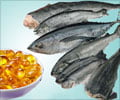Fish oils could minimise the effects that junk food can have on the brain, reveal data from more than 180 research papers.

Research over the past 10 years has indicated that high-fat diets could disrupt neurogenesis, a process that generates new nerve cells, but diets rich in omega-3s could prevent these negative effects by stimulating the area of the brain that control feeding, learning and memory.
Data from 185 research papers revealed, however, that fish oils do not have a direct impact on this process in these areas of the brain, but are likely to play a significant role in stalling refined sugars and saturated fats' ability to inhibit the brain's control on the body's intake of food.
Dr Lucy Pickavance, from the University's Institute of Ageing and Chronic Disease, explains: "Body weight is influenced by many factors, and some of the most important of these are the nutrients we consume. Excessive intake of certain macronutrients, the refined sugars and saturated fats found in junk food, can lead to weight gain, disrupt metabolism and even affect mental processing."
"These changes can be seen in the brain's structure, including its ability to generate new nerve cells, potentially linking obesity to neurodegenerative diseases. Research, however, has suggested that omega-3 fish oils can reverse or even prevent these effects. We wanted to investigate the literature on this topic to determine whether there is evidence to suggest that omega-3s might aid weight loss by stimulating particular brain processes."
Research papers showed that on high-fat diets hormones that are secreted from body tissues into the circulation after eating, and which normally protect neurons and stimulate their growth, are prevented from passing into the brain by increased circulation of inflammatory molecules and a type of fat called triglycerides.
Dr Pickavance added: "Fish oils don't appear to have a direct impact on weight loss, but they may take the brakes off the detrimental effects of some of the processes triggered in the brain by high-fat diets. They seem to mimic the effects of calorie restrictive diets and including more oily fish or fish oil supplements in our diets could certainly be a positive step forward for those wanting to improve their general health."
Dr Pickavance will exhibit her work on obesity at Liverpool World Museum for members of the public on the 8 June, as part of the University's Institute of Ageing and Chronic Disease 'Meet the Scientist' event.
Source-Eurekalert
 MEDINDIA
MEDINDIA




 Email
Email










